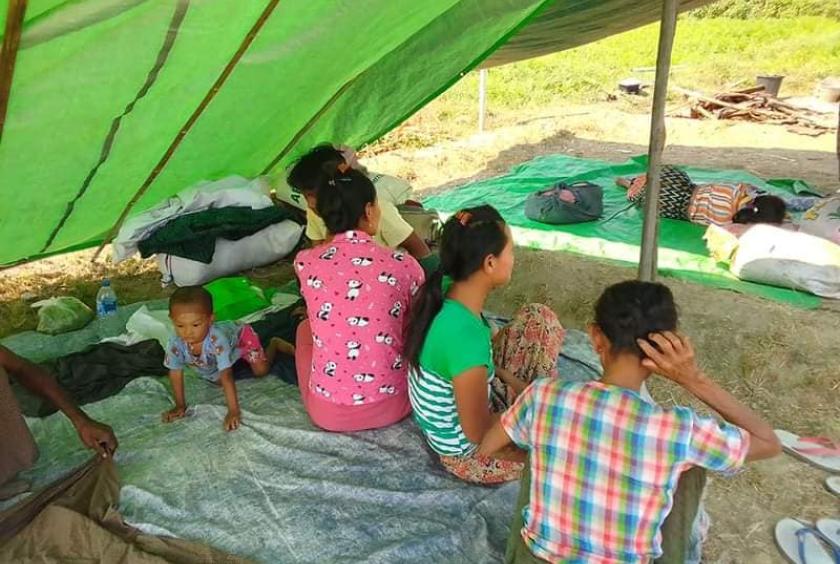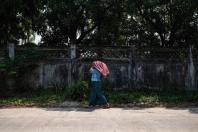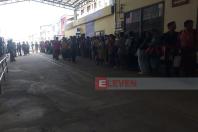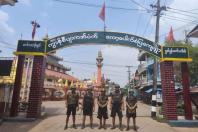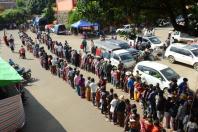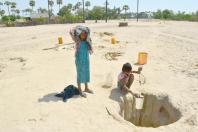“If you ask me, we can still live in our village. We have yet to flee. But when firing comes, we have to run. We had to run about five times last year. While there are still villages that are peaceful, other villages remain deserted as their people are fleeing in panic,” said a local resident from a southeastern village in Myaing Township, Magway Region.
They have never thought that they have to flee like this due to battles. The arid regions in central Myanmar had never dreamed that they would experience such armed conflicts. Now, the people there have to live inside or outside their villages depending on situation. What’s more, the impact on their socio-economy is huge. In the previous cultivation season, crops could be grown more or less. But there are no certainties about their cultivation in coming monsoon.
It’s no longer easy for them to go to downtown areas for shopping. On the way there, there are several checkpoints being operated by armed groups. Time restrictions also make it difficult to engage in daytime trade activities. Despite various difficulties, the villagers have no other places to move to.
“We have to take our national registration cards when we go to town. The other day, I went from Myaing to Yesagyo and faced checks from both sides—police or security forces and PDF (people’s defence force) members. We feel unsecure because we have to live among guns. As the curfew is from 6pm to 6am, if something happens to you such as sickness or stomach ache, just try to endure them. Go to a clinic or hospital only in the following morning. Under current circumstances, nothing is good here,” said a local villager from Myaing Township.
Farmers in the villages of Myaing Township are unable to engage properly in agricultural activities including a palm sugar production, which is their major business. Commodity flow at wholesale centers in Pakokku is much slower than it used to be.
They are even worried that they cannot grow crops in the early summer period. Even though some communities are quiet and peaceful, insecure road transport has led to difficulties in trade. Livestock breeding is not well operative either, local people say.
“Here, goats and cows are raised. Usually we do open farming. Cattle eat plants by and near roads. We don’t need money to feed them. We only have to pay cowboys. But now we cannot send our cattle outside because of landmines. So we have to sell them. Cage farming is no easier because we dare not live in our villages always,” said a local from Pakokku.
Last month, a horse farm in Myitche, Pakokku Township, was attacked. Since then, regional instability has reigned and consequently, villagers are fleeing their homes. Some have fled to Bagan-NyaungU in the eastern part of the Ayeyawady River.
Regarding displacement, in a Facebook post, a monk says ironically “I didn’t imagine I had to go to the jungle for meditation. May they be safe and sound”. The post carries the photos featuring local villagers hiding in trees and plants.
A local resident in NyaungU said: “There are over 100 villagers who have fled from the western bank of the river to NyaungU. Among them are elders and young children. They dare not go back. They could not even bring pots and pans for cooking. We have to provide them with accommodation and meals.”
In the townships of Pakokku District, some crops rely on winter and some on monsoon. Onion, beans and peas and Virginia tobacco are winter crops. This year sees less onion cultivation.
With regional instability, farmers’ cultivation capacity is waning. Martial law has been imposed in Pauk Township, a mass producer of onion and tobacco.
“As the factories in China resume operations, they are buying agricultural products again from here. Now, tobacco market has become a bit active. We have to sell the old tobaccos that have been stored over the past few years. New tobacco will not come in large numbers because of low cultivation capacity this year,” said a tobacco dealer.
The cultivation of winter peas is also low this year. This might be because of fewer groundnut oil consumers or regional instability. In consequence, wholesalers and workers alike are earning less income. Poor farming affects other businesses as well.
More lethal weapons are permeating the central Myanmar contributing to regional instability. Consequently, economic, education, health and social conditions of the local people are getting poor. With the uncertain present and bleak future, all the arid regions in the central part of the country are certainly looking forward to peace and tranquility.

